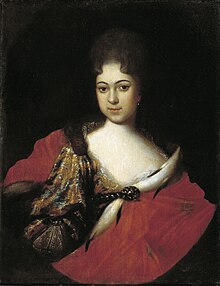tsarevna
Appearance
English
[edit]
Alternative forms
[edit]- czarevna
- tsesarevna
- tzarevna
- Tsarevna (particularly when used as a title)
Etymology
[edit]Borrowed from Russian царе́вна (carévna).
Pronunciation
[edit]- IPA(key): /(t)sɑːˈɹɛvnə/, /zɑːˈɹɛvnə/
Audio (Southern England): (file) Audio (Southern England): (file) Audio (Southern England): (file)
Noun
[edit]tsarevna (plural tsarevnas or tsarevny)
- The daughter of a tsar.
- 1967, Leo Wiener, Anthology of Russian Literature from the Earliest Period to the Present Time[1], volume 1, page 138:
- The Tsaréviches and Tsarévnas have each separate apartments and servants to look after them.
- 1990, Lindsey Hughes, Sophia, Regent of Russia: 1657–1704, New Haven, Conn., London: Yale University Press, →ISBN, page 18:
- The ban on marriage for the tsarevny was clearly linked with developments in Russia’s political structure and religious status.
- 2001, Isolde Thyrêt, Between God and Tsar: Religious Symbolism and the Royal Women of Muscovite Russia, Northern Illinois University Press, →ISBN, page 14:
- If my research treats the potential of Muscovite tsaritsy and tsarevny to participate in affairs of the realm optimistically, this does not imply that I deny the difficulties of their position.
- 2004, Evgeniĭ Viktorovich Anisimov, Five Empresses: Court Life in Eighteenth-Century Russia[2], page 186:
- And a long line of bridegrooms courted the tsarevna one after another: […] Perhaps the fastidious tsarevna might even have found some of the bridegrooms to her liking.
- 2010, Yelena Mazour-Matusevich, Alexandra S. Korros, Aron I͡Akovlevich Gurevich, Saluting Aron Gurevich: Essays in History, Literature and Other Related Subjects, page 120:
- There he became acquainted with maids in service to Ekaterina Alekseevna, Peter the Great's half-sister, and through them, he gained the tsarevna’s favor.
- 2012, Barbara Evans Clements, A History of Women in Russia: From Earliest Times to the Present, Indiana University Press, →ISBN, pages 37–38:
- And no women were more walled in than the tsarevny, the daughters of the tsars, for they were prohibited from marrying on the grounds that no Russian was high-ranking enough for them and no suitably prestigious royal foreigner professed the true faith, that is, Russian Orthodoxy. So the grandiose ambitions of the tsarevny’s fathers led to lifelong spinsterhood for them.
Related terms
[edit]Anagrams
[edit]Norwegian Bokmål
[edit]Etymology
[edit]From Russian царе́вна (carévna).
Noun
[edit]tsarevna m (definite singular tsarevnaen, indefinite plural tsarevnaer, definite plural tsarevnaene)
See also
[edit]- tsarevitsj m (“tsarevich”)
References
[edit]- “tsarevna” in The Bokmål Dictionary.
Norwegian Nynorsk
[edit]Etymology
[edit]From Russian царе́вна (carévna).
Noun
[edit]tsarevna f (definite singular tsarevnaa, indefinite plural tsarevnaer, definite plural tsarevnaene)
See also
[edit]- tsarevitsj m (“tsarevich”)
References
[edit]- “tsarevna” in The Nynorsk Dictionary.
Categories:
- English terms borrowed from Russian
- English terms derived from Russian
- English 3-syllable words
- English terms with IPA pronunciation
- English terms with audio pronunciation
- English lemmas
- English nouns
- English countable nouns
- English nouns with irregular plurals
- English terms with quotations
- English terms with initial /t͡s/
- English female equivalent nouns
- Norwegian Bokmål terms borrowed from Russian
- Norwegian Bokmål terms derived from Russian
- Norwegian Bokmål lemmas
- Norwegian Bokmål nouns
- Norwegian Bokmål masculine nouns
- Norwegian Nynorsk terms borrowed from Russian
- Norwegian Nynorsk terms derived from Russian
- Norwegian Nynorsk lemmas
- Norwegian Nynorsk nouns
- Norwegian Nynorsk feminine nouns

